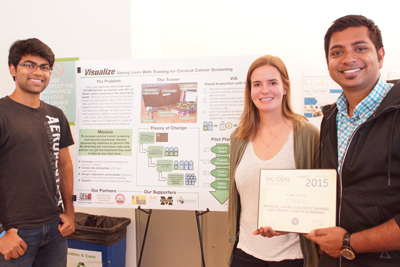 Every year cervical cancer causes 275,000 deaths worldwide. Screening for cervical cancer significantly reduces this mortality rate, given that most cervical cancer cases caught early are treatable. Visual inspection of the cervix with acetic acid (VIA) is a low-cost and effective method to screen for cervical cancer. VIA is not widely used, however, due to a lack of training and awareness of the method. With proper training and follow-up, VIA can avert 68% of cervical cancer related deaths; thus saving an estimated 150,000 lives in low and lower-middle income countries. The aim of this project is to design and implement a trainer and training program to teach VIA to midwives in Ghana, implementing three phases. Phase 0, which has already been completed, was to develop a low-cost, low-fidelity simulator to assist in training of midwives on VIA. Phase 1 is to develop an implementation plan to launch this program in Ghana and begin training a small group of midwives over the next year. Phase 2 will leverage the initial target group of midwifery students and train them to teach VIA to other midwives in Ghana. This allows more women to get screened for cervical cancer and detect pre-cancerous cells early, thus allowing these women to get the treatment they need to save their lives.
Every year cervical cancer causes 275,000 deaths worldwide. Screening for cervical cancer significantly reduces this mortality rate, given that most cervical cancer cases caught early are treatable. Visual inspection of the cervix with acetic acid (VIA) is a low-cost and effective method to screen for cervical cancer. VIA is not widely used, however, due to a lack of training and awareness of the method. With proper training and follow-up, VIA can avert 68% of cervical cancer related deaths; thus saving an estimated 150,000 lives in low and lower-middle income countries. The aim of this project is to design and implement a trainer and training program to teach VIA to midwives in Ghana, implementing three phases. Phase 0, which has already been completed, was to develop a low-cost, low-fidelity simulator to assist in training of midwives on VIA. Phase 1 is to develop an implementation plan to launch this program in Ghana and begin training a small group of midwives over the next year. Phase 2 will leverage the initial target group of midwifery students and train them to teach VIA to other midwives in Ghana. This allows more women to get screened for cervical cancer and detect pre-cancerous cells early, thus allowing these women to get the treatment they need to save their lives.
Kids Write (College of William & Mary)
Through Kids Write, Haitian students in grades 1 to 4 can grow their literacy skills by reading and writing in their mother-tongue language, Haitian Creole,

